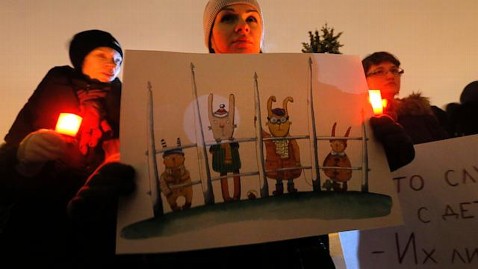Russia Allows Final Child Adoptions to Leave for US

Dmitry Lovetsky/AP Photo
MOSCOW - The 22-month-old boy ran out with a big smile and exclaimed, "Mama!"
It was a moment Robert and Kim Summers had dreamt of for months, but feared would never happen.
After weeks of uncertainty and diplomatic wrangling, Russian authorities have begun to allow a final few adoptions to the United States to proceed, squeaking in under the wire despite Russia's new ban on adoptions to the United States.
The boy, whom the Summers have renamed Preston, is among just a handful of Russian orphans were able to leave the country starting last Thursday. U.S. officials said they expect nearly two dozen more to leave in the coming days, and they hope more will soon follow.
They are among 52 adoptions that were in legal limbo after Russia's ban on adoptions by Americans went into effect on Jan. 1. The measure was part of Russia's retaliation for a set of human rights sanctions President Obama signed into law last month.
After back-and-forth statements from various Russian officials about whether those cases would be subject to the ban or not, senior Russian officials said they would allow them to proceed. They had received court approval before the ban went into effect.
Still, it was not so easy. After the ban was announced, Robert and Kim Summers spent hours on the phone, calling their adoption agency, members of Congress and anyone else they thought could help.
"We decided we were going to bring this baby home, no matter what it took," Robert said.
Finally, they decided to fly to Russia anyway in hope that they would be allowed to bring Preston home. When they took off they had no idea if the boy would be with them on the return flight.
They traveled to Preston's orphanage in Kaluga, a few hours south of Moscow. They had not seen him since Dec. 12, but after he ran to greet them they were reassured they were doing the right thing.
They were supposed to bring Preston home on Jan. 11, but the date came and went. A judge gave final approval, but officials in the passport office were reluctant to issue travel documents because they did not know if the adoption ban applied in this case.
After days of pleading they finally received the passport. On Sunday they boarded a plane to New York. Preston was so excited he did not sleep on the entire ten-hour flight.
The family's difficulties were not unique. Families and U.S. officials said that lower-level Russian bureaucrats have been reluctant to process travel documents amid the confusion over what was banned and what was not. Last week Russia's children's ombudsman, Pavel Astakhav, who supports the ban, tried to clear up the confusion and promised to intervene personally in any cases that were blocked.
Still, there are some cases that remain stuck. According to families and officials, Russian judges and officials have refused to provide travel documents despite the clearer guidance from Moscow. U.S. officials said the problem is appearing only in certain regions, but declined to identify which ones.
But even though they say they are hopeful that most, if not all, of the 52 cases will proceed, U.S. officials have turned their attention to the potentially hundreds of other adoptions that remain more precarious. In those cases families may have even visited a child multiple times, but did not receive court approval prior to the Jan. 1 cutoff.
U.S. officials say they are urging the Russians to interpret their exceptions to the ban - that they will allow adoptions in process to proceed - to include such cases.
So far Russian officials have said they will honor only those cases already approved by a judge.